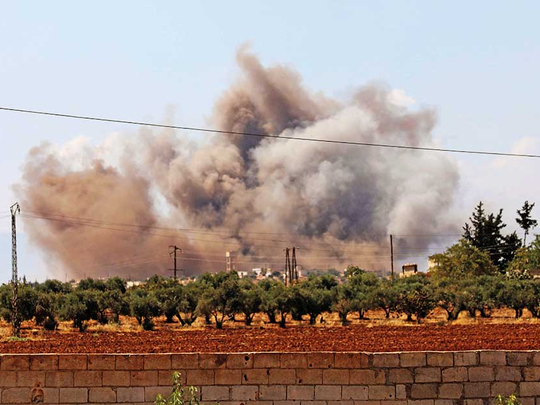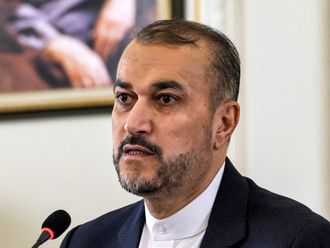
Amman: Russian and Syrian warplanes pounded towns in Syria’s opposition-held Idlib province on Saturday, a day after a summit of the presidents of Turkey, Iran and Russia failed to agree on a ceasefire that would forestall a Russian-backed offensive.
The Britain-based Syrian Observatory for Human Rights describes the air strikes as the “most intense” since August when government forces began targeting the southern edge of Idlib province, the rebel’s last stronghold in Syria.
The Observatory recorded 68 air raids in the southwestern Idlib town of Khan Sheikhoun, and other villages and towns in the province and in northern Hama.
It said at least four civilians were killed, including two children and a woman, most of them in Abdeen, a village west Khan of Sheikhoun.
The White Helmets, a team of first responders, said it also recorded the four killed in Abdeen. The rescuers said another was killed in Halba, a village further north. The group said one of its already damaged centres has been hit in the wave of air strikes.
Syrian helicopters dropped so-called barrel bombs — containers filled with explosive material — on civilian homes on the outskirts of the city of Khan Sheikhoun, two residents of the area in southern Idlib said.
Meanwhile, President Recep Tayyip Erdogan said Turkey won’t watch the killings of tens of thousands of innocent people from the sidelines. Erdogan said this after Russian President Vladimir Putin rejected his call for a ceasefire in Idlib.
Turkey won’t be part of a game to further the interests of Syrian President Bashar Al Assad, Erdogan said. He had warned earlier of a looming “catastrophe” as the Damascus regime’s forces prepare to fight the last major battle of the seven-year civil war.
“We will neither watch from the sidelines nor participate in such a game,” Erdogan said in a message on Twitter, several hours after Putin on Friday rebuffed his call for a ceasefire in Idlib at a summit in Tehran. Erdogan warned at the summit that the province, home to almost 3 million people, is at risk of turning into “a lake of blood.”
Turkey, which is sheltering the largest number of Syrian refugees in the world, is bracing for a fresh wave of refugees from Idlib, where tens of thousands of radical militants and Turkey-backed moderate rebels are threatened by a looming attack by Syrian forces who are reinforced from the air by Russian warplanes.
“Idlib is a ticking bomb. We can turn it off and start a new process in Syria if the international community gets serious about the Syrian war and shows that they do care about the Syrian people,” Erdogan’s spokesman Ebrahim Kalin wrote in an article published by Daily Sabah on Saturday.
“Any attack on this province of 3.5 million people will lead to a major humanitarian catastrophe. It will trigger another wave of migration into Turkey and from there to Europe and elsewhere,” and undermine all political efforts under both the Geneva and Astana processes.
Idlib was declared a de-escalation zone under the Astana agreement between Turkey, Russia and Iran in March. All three nations have established military posts in the province to monitor for any flare-ups of violence. Turkey has 12 outposts on the perimeters of Idlib.
“The presence of Turkish soldiers there is probably the only guarantee to prevent any major assault, because the Russian jet fighters and the regime ground forces cannot afford attacks while Turkish soldiers are there,” Kalin said. “We know that they do not care about civilians and legitimate, moderate opposition forces. Any attack on Idlib in the name of eliminating terrorist groups would undermine the Astana process.”
— Agencies
Box
US lacks leverage as assault on Syrian enclave looms
Washington (AP): Despite dire US warnings and fears of a humanitarian disaster, the Trump administration has little leverage to stop Russia, Iran and Syria pressing ahead with a massive military assault against Syria’s northwest Idlib province.
Washington has threatened military action in case of a chemical weapons attack but its mixed messaging on retaining a US presence in Syria and a cut in aid has diminished its already limited influence over the seven-year conflict.
So the administration, which has criticised former President Barack Obama for his inaction on Syria after the war started in 2011, risks appearing powerless to prevent the three nations’ plan to retake Syria’s last rebel-held area.
While the new US special envoy for Syria said this week that America will stay in Syria until the complete eradication of Daesh, there’s little assurance that President Donald Trump won’t again seek the withdrawal of the roughly 2,000 US troops in the country. And in a sign of the administration’s shrinking commitment to Syria, it has pulled more than $200 million in stabilisation funding for liberated areas, telling other nations they should step up to pay.












